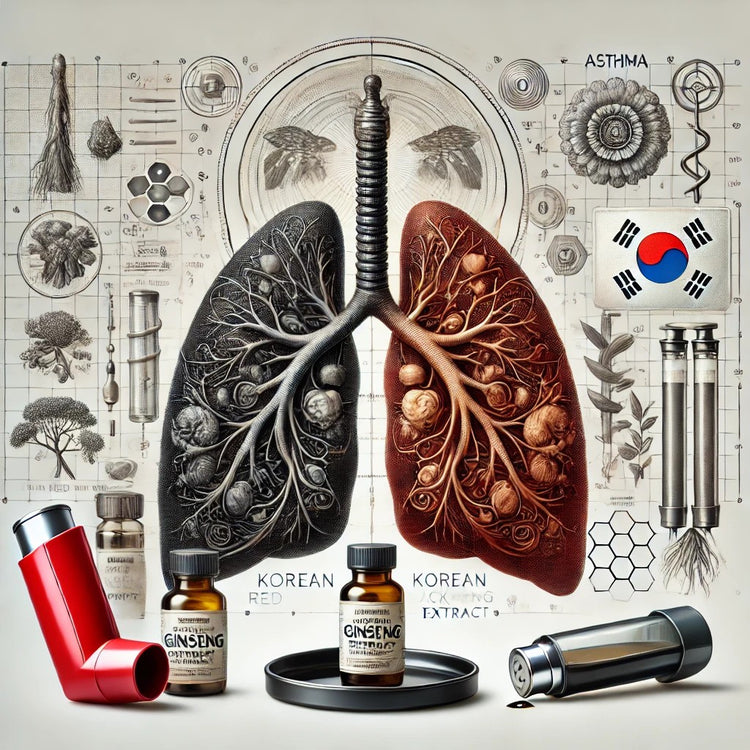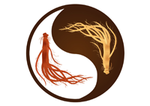
What is the cause of asthma?
Asthma is a chronic respiratory disease that affects a significant proportion of the world's population. Asthma is characterised by chronic inflammation of the airways, mucus build-up and airway hyperresponsiveness, leading to breathlessness, coughing and chest tightness.
Many factors contribute to the development of asthma, including genetic predisposition and environmental influences. In recent years, research has focused on naturally occurring antioxidant compounds that can help reduce inflammation and oxidative stress and thus reduce asthma symptoms. One such substance is Korean red ginseng, which is widely used as a traditional medicine in Asia. Below we summarise a study that investigated the effects of Korean red ginseng in allergic asthma, with a particular focus on its effects on lung inflammation and oxidation.

Characteristics and mechanisms of action of Korean red or black ginseng
Korean red ginseng (Panax ginseng) is made exclusively from the roots of six-year-old plants, which are processed by steaming and drying. This processing method ensures that the ginseng contains sufficient amounts of active ingredients such as ginsenosides, which have various beneficial effects. Research has made it clear that only six-year-old Korean red or black ginseng is able to produce the right antioxidant and anti-inflammatory effects, as ginseng of this age contains the highest amount of active ingredients. Ginseng preparations derived from younger plants do not achieve the same effect as they contain less ginsenoside.
Background and objective of the research
The aim of this study was to investigate the therapeutic effects of Korean red ginseng (KRG) in an ovalbumin (OVA - a major protein found in egg white) induced allergic asthma model. OVA has been widely used to induce allergic asthma in mouse models, as it elicits an immune response similar to that in human asthma. In this study, mice were sensitised with two injections of OVA and then exposed to an OVA aerosol test, which caused intense inflammation and airway hyperreactivity. Ginseng treatment was applied at different doses to determine its effects in reducing inflammation, oxidative stress and mucus formation. The researchers focused specifically on the production of ROS (reactive oxygen molecules), as well as levels of inflammatory cytokines (a type of signalling molecule that plays a key role in cell communication) and antioxidant molecules.
How does Korean red ginseng extract reduce asthma symptoms?
Asthma symptoms include shortness of breath, chest tightness and persistent coughing. Research has shown that Korean red (or black) ginseng extract significantly reduced levels of Th2 cytokines, thereby reducing the inflammatory response. Levels of IL-4, IL-5 and IL-13 in bronchoalveolar lavage fluid (BALF) and total serum immunoglobulin E (IgE) were all significantly lower in the ginseng-treated groups than in the OVA group. The antioxidant effect was also evident: ginseng inhibited ROS production in lung tissue, thus reducing oxidative stress, a major cause of inflammation. These results contribute to the effective relief of asthma symptoms with ginseng.
Why six-year-old Korean red or black ginseng extract?
Natural treatments for asthma include a number of naturally-derived active ingredients, but only six-year-old Korean red ginseng contains sufficient active ingredients to provide effective therapy. The antioxidant and anti-inflammatory effects of the ginsenosides found in six-year-old ginseng are much more pronounced than in younger plants.
Home treatment of asthma is also very popular, but it is important to note that not all preparations of natural origin are equally effective. Among the herbs commonly used in the home treatment of asthma, Korean red ginseng stands out for its effectiveness. However, it is important that only six-year-old ginseng is used, as only this properly mature plant contains the necessary active ingredients for anti-inflammatory and antioxidant protection.
Reduction of airway hyperreactivity and mucus production
Airway hyperresponsiveness (AHR) is a major feature of asthma symptoms, which is an increased response of airway smooth muscle to various stimuli. In this study, mice treated with ginseng showed significantly lower AHR levels than groups treated with OVA. In addition, ginseng inhibited mucus production in lung tissue, resulting in a reduction in the overproduction of mucus that is common in asthmatics.
Exacerbating factors in asthma include mucus build-up in the airways, which can block airways, increasing airway obstruction. Korean red ginseng has been shown to significantly reduce mucus production, as confirmed by histopathological examination of lung tissue. The number of mucus-coated cells was also significantly lower in the ginseng treatment group than in the OVA group, clearly indicating an inhibitory effect of ginseng on mucus production.
Research results and further information
The full text of the research results is available at: Korean Red Ginseng Ameliorates Allergic Asthma through Reduction of Lung Inflammation and Oxidation. The summary of the results shows that Korean red ginseng has significant therapeutic potential in the treatment of asthma, particularly with regard to its anti-inflammatory and antioxidant effects.
Summary
In conclusion, Korean red ginseng may be effective in the treatment of allergic asthma. Ginseng extract reduced airway hyperresponsiveness, inflammatory cell infiltration and mucus formation in lung tissue, and attenuated oxidative stress and inflammatory responses. These effects were achieved through inhibition of antioxidant defence mechanisms such as the NRF2/HO-1 signalling pathway and inflammatory mediators such as NF-κB and iNOS. Based on the results of this study, Korean red ginseng may be a promising natural therapeutic agent for the treatment of asthma, particularly in reducing oxidative stress and inflammatory responses.
Further details of the research and the exact methods can be found in the full study, which can be accessed by clickinghere.
In particular, we recommend the following 6-year-old Ginseng preparations from the root (click on the images below):
Further research on Korean ginseng and asthma:




